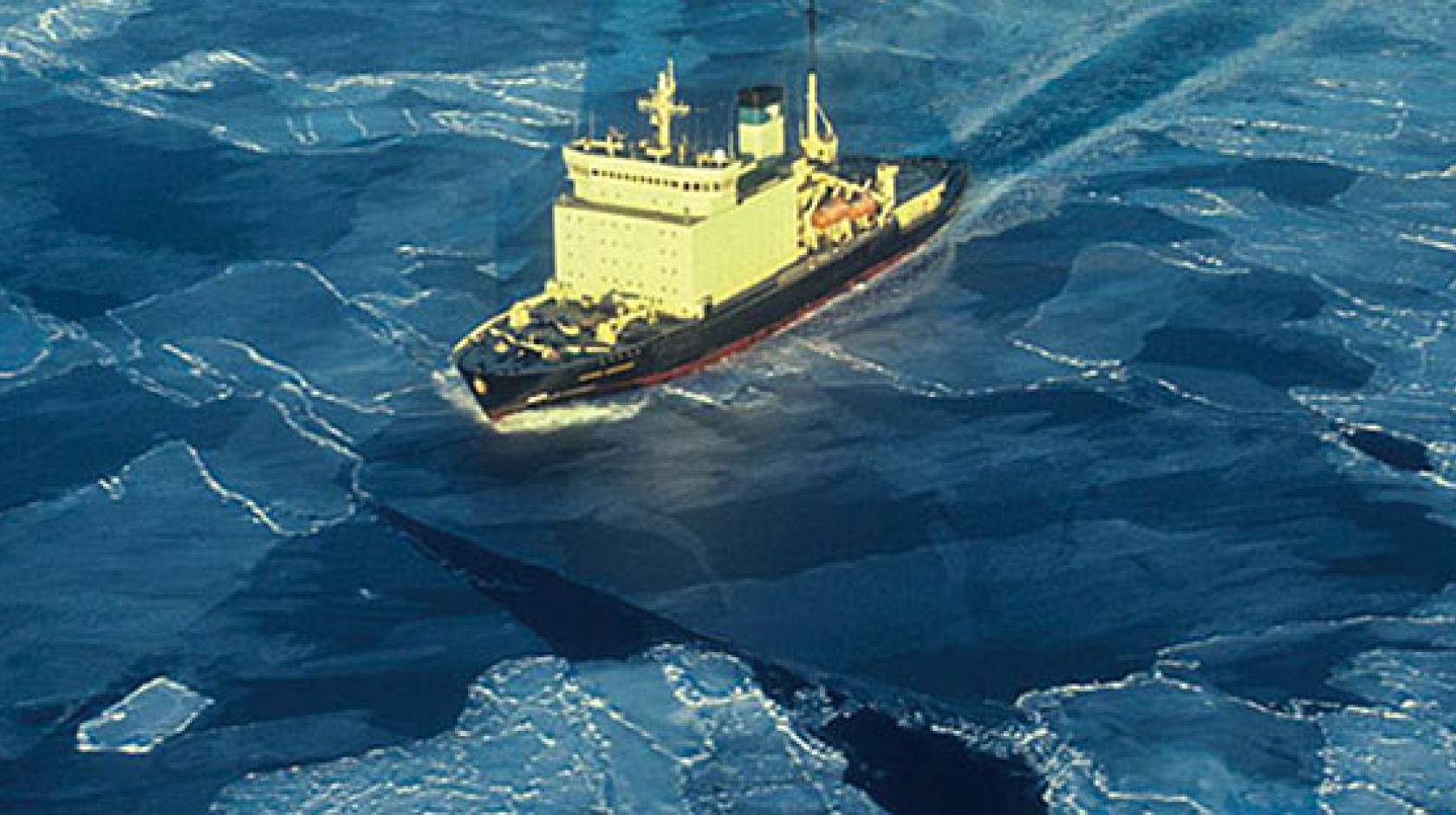Mario Aguilera, UC San Diego

In the most authoritative forum yet held on the role of the polar regions in global climate change, the American Polar Society — the 80-year-old organization linking scientists, explorers, and enthusiasts with deep interest in polar issues — and Scripps Institution of Oceanography at UC San Diego are jointly bringing together world-class leaders in science and diplomacy in a symposium to review the latest findings from research on the impact of rising global temperatures on sea and land ice and their ecosystems at the top and bottom of the world.
To be held at Scripps Oceanography Nov. 3-6, 2015, the symposium will feature the latest research of such scientific luminaries as David Ainley, Cecilia Bitz, Lawson Brigham, Julian Dowdeswell, Sylvia Earle, Jacqueline Grebmeier, James Hansen, Ola Johannessen, Gerald Kooyman, Walter Munk, Claire Parkinson, Ted Scambos, Lynne Talley, David VanderZwaag and John Walsh.
“Climate change in the past several decades has been apparent in many locations around the world, but nowhere is it more evident than in the polar regions,” notes Alfred S. McLaren, APS president, who has organized the conference with Scripps to commemorate the society's 80th anniversary. “In the Arctic, retreating sea-ice cover, melting glaciers, thawing permafrost and bubbling methane gases are already impinging on indigenous Arctic cultures and numerous species, from microscopic organisms living within the ice to the massive walrus and majestic polar bear.
“In the Antarctic, the effects of global warming on biological marine life are, at present, less clear, although there has been significant decay of the gigantic Antarctic ice sheet and ice shelves, assisted by warming ocean waters. Our intention in assembling this stellar group of scientists and policy analysts is to try to reach some scientific consensus about the effects of current and projected climatic trends on the two poles—trends that most certainly will impact the rest of the world.”
“This APS symposium will address the critical current and projected climate impacts on both poles,” said Margaret Leinen, director of Scripps Institution of Oceanography at UC San Diego and president of the American Geophysical Union. “Working across disciplines will give us new opportunities to develop science-based solutions to these challenges and pave the way for how societies can best adapt to them.”
James Hansen of Columbia University is probably best known for his testimony on climate change in the 1980s before the U.S. Congress that helped raise broad awareness of global warming. Recently Hansen and 16 co-authors have asserted that glaciers in Greenland and Antarctica will melt 10 times faster than previous consensus has estimated, resulting in sea-level rise of at least 10 feet in as little as 50 years, a conclusion drawn from climate records, computer models, and observations of current rates of sea-level rise.
Walker Munk, professor of geophysics at Scripps and widely regarded as the world’s greatest living oceanographer, was recently profiled in the New York Times as the “Einstein of the Oceans” for pioneering the science of wave prediction, estimating the behavior of breakers and surf that helped Allied boats land safely on the Normandy beaches in World War II and saving countless lives. In addition to his contributions to science’s understanding of waves, currents, tides, and the formation of the Earth and moon systems, Munk’s current work focuses on climate change and sea-level rise related to their severe impact on humankind. He has held the Secretary of the Navy/Chief of Naval Operations Oceanography Chair at Scripps for more than 32 years.
Sylvia Earle, world-renowned oceanographer and ocean advocate, will give the keynote address at the symposium, “Exploring and Protecting Polar Oceans.” Norman Augustine, former Chairman and Chief Executive Officer of Lockheed Martin Corporation, will be the banquet speaker, presenting “The Science of Climate Change — and the Change in the Climate of Science.” According to Augustine, “At this very time, America is disinvesting in science—a practice that will need to be reversed if science is to continue to lead the way in meeting many of the world’s great challenges, particularly with regard to such existential matters as climate change.” Additionally, Kelly Falkner, director of the National Science Foundation’s Division of Polar Programs, will provide an overview of polar programs at the NSF.
The 15 leading climate scientists will speak under five major headings: Changing Circulation in the Southern and Arctic Oceans; Changing Sea Ice and Global Impacts; Changing Polar Marine Ecosystems and Biodiversity; Changing Cryosphere (Glaciers) and Polar Ocean Connections; and Changing Governance, Marine Use, and Indigenous Peoples.
Principal findings
- That Arctic sea-ice extent, among the best observed of all climate variables, has decreased significantly from 1978 to 2014, solidly in line with an array of other changes in the Arctic, including warming temperatures, decreasing land-ice coverage, and a lengthened growing season for some plant life (Parkinson);
- That the dramatic decline in Arctic sea ice may impact the Polar Jet Stream, weather, and climate at lower latitudes. Variations in the Arctic sea ice in spring may already be influencing the East Asian monsoon system. To be determined is whether the projected ice-free Arctic summer may or may not affect the Polar Jet Stream, weather, and climate in Europe in the future (Johannessen);
- That sea-ice extent in the Southern Hemisphere and Antarctic may have slightlyincreased in comparison with the Arctic’s large sea-ice reduction over the past decade in response to climate change—such increase in part due to upwelled deep waters warming the Antarctic ice shelves (Bitz and Talley);
- That model projections show that sea-ice loss and surface warming in the Southern Ocean will remain far behind changes in the Arctic through the end of the 21stcentury (Bitz);
- That ocean warming and a change in regional wind patterns have conspired to cause the disintegration of several major areas of the Antarctic Peninsula through a complex interaction of weather changes, surface melting, changing ocean currents, and basal thinning of the ice shelves (Scambos);
- In the last survey conducted in 2012, it was found that, on Cape Washington, one of the largest penguin colonies produced only half the number of chicks that it did in the 1990s (Kooyman);
- That the Adélie penguin may qualify as an “indicator species extraordinaire” in the context of gauging biotic response to environmental change in the Antarctic (Ainley).
Other key topics
- The marine geological record of past ice-sheet growth to test the predictive capability of ice-sheet numerical models (Dowdeswell);
- The historical record of sea-ice changes to place recent sea-ice loss in long-term context, addressing the potential role of natural variability (Walsh);
- Issues concerning the ability of computer models to simulate ice-sheet stability and sea level as an aid to understanding the human impact on global climate (Hansen);
- Changes in global ocean circulation as the result of increased human carbon consumption and attendant CO2 release causing a radiation imbalance and temperature rise (Munk);
- The responses of biological marine systems to environmental changes in the Pacific Arctic (Grebmeier).
On the issue of changing governance, marine use and indigenous peoples, Lawson Brigham, University of Alaska Fairbanks, notes that globalization — the linkages of Arctic natural resources to global markets — is changing the maritime Arctic environment in unprecedented ways. The decreasing ice cover in the Arctic, the opening of new shipping lanes, and increased access to vast mineral resources are calling for new governance arrangements and unified strategies to facilitate marine use while enhancing the safety and protection of Arctic peoples and the marine environment.
Echoing Brigham, David VanderZwaag, Marine and Environmental Law Institute, Dalhousie University, will provide a “speed cruise” through international law and policy, suggesting that territorial conflicts and other impediments will challenge efforts to go beyond national jurisdictions in fashioning future governance arrangements to protect ecologically and culturally significant areas of the central Arctic Ocean.
The symposium will end with a roundtable panel discussion on “The Future of the Polar Oceans — What Has Not Been Addressed,” moderated by APS president McLaren.
In addition to the co-sponsorship of Scripps Institution of Oceanography, this symposium has been made possible by major contributions from members of the American Polar Society, most particularly Avery Russell, John Splettstoesser, Jim Collinson, and Rick and Patty Elkus. Additional support has been provided by the Kane Lodge Foundation, and Adventure Canada.
For more information about the American Polar Society and its journal, The Polar Times, click here.

